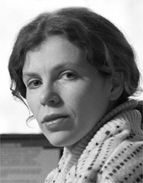 Yulia Latynina
Yulia LatyninaThe Rossia 10 contest organized by the Russian Geographic Society and created to promote Russia as "a unique country with a rich cultural and natural heritage" has turned into a farce. In place of a nationwide vote for significant landmarks, it has become a contest between the administrative resources of overly image conscious regional governors.
Because Moscow and St. Petersburg did not employ their administrative resources to win, both St. Basil's Cathedral on Red Square and St. Petersburg's Bronze Horseman statue failed to make the finals.
Meanwhile, the governor of Penza put in a sterling performance, and his city's Legend sculpture park took third place in the second round of the competition. And although the 275 sculptural reproductions in the Penza park do comprise a unique collection, the countless works housed in the Hermitage — a world-famous museum that the contest entirely overlooked — are undoubtedly of far greater value.
However, Russia's republics worked harder than most. After the second round of voting, the list of Russian monuments vying to be in the top 10 includes the Golden Abode of Buddha Shakyamuni, erected on the site of a former concrete factory in the Kalmyk republic, and the Kul-Sharif mosque in Tatarstan. Both were completed in 2005.
The third round will choose the 10 best entries from among the 30 now in the running. As of this writing, the lead is held by the Vovnushki complex of medieval towers in Ingushetia and is followed by the Naryn-Kala fortress in the Dagestani town of Derbent, with a foundation dating back to the 5th century.
Of course, Chechen leader Ramzan Kadyrov outdid them all.
The manner in which the voting took place in Chechnya is already legendary. With 38 million votes, the Heart of Chechnya mosque named for the late leader Akhmad Kadyrov was the clear frontrunner in the second round of the contest, but Kremlin officials realized that would result in a huge scandal. Some votes were "lost," Kadyrov was outraged and a scene nearly erupted in the Beeline office in Chechnya reminiscent of what happened to Griboyedov in Persia.
After the Heart of Chechnya mosque was pushed out of the running, the No. 1 symbol in Russia became the Kolomna kremlin. The fortress was built between 1525 and 1531 in the traditional design of the pre-cannon era , with high crenellated walls and round towers rather than earthworks and bastions. In other words, the structure had become outdated as a form of defense even before construction began.
The problem is that the 10 symbols of Russia are not just a PR stunt. They will be reconstructed in miniature in a park near Domodedovo. Like the 2014 Winter Olympics in Sochi, this will be yet another corruption-ridden waste of taxpayers' money, and especially senseless given economic difficulties that President Vladimir Putin himself pointed out.
On the other hand, this collection of aging and modern relics — including a fortress that was obsolete before it was even built — will make a perfect symbol of Putin's Russia. That is, unless the Kremlin realizes its mistake and quietly mothballs the idea out of shame.
But that is unlikely because the chairman of the board of the Russian Geographic Society — an organizer of major expeditions and one of the oldest and most respected scientific societies in the world — is none other than Putin. And until recently, the director was a certain Marina Ignatova, a State Duma deputy from United Russia and the head of the Druzhba construction company, a firm implicated in numerous scandals involving fraudulent construction deals with apartment owners.
Yulia Latynina hosts a political talk show on Ekho Moskvy radio.
A Message from The Moscow Times:
Dear readers,
We are facing unprecedented challenges. Russia's Prosecutor General's Office has designated The Moscow Times as an "undesirable" organization, criminalizing our work and putting our staff at risk of prosecution. This follows our earlier unjust labeling as a "foreign agent."
These actions are direct attempts to silence independent journalism in Russia. The authorities claim our work "discredits the decisions of the Russian leadership." We see things differently: we strive to provide accurate, unbiased reporting on Russia.
We, the journalists of The Moscow Times, refuse to be silenced. But to continue our work, we need your help.
Your support, no matter how small, makes a world of difference. If you can, please support us monthly starting from just $2. It's quick to set up, and every contribution makes a significant impact.
By supporting The Moscow Times, you're defending open, independent journalism in the face of repression. Thank you for standing with us.
Remind me later.







